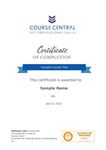
Conflict Management: Emotional Intelligence at work
Conflict Management with Emotional Intelligence all-in-one online course by experts | Free PDF Certificate
Course Central
Summary
- Tutor is available to students
Add to basket or enquire
Overview
A masterclass in Conflict Management covering all essential parts of healthy relationships, working with conflict, emotional intelligence, principles of giving and receiving, resolving conflicts, the importance of trust, and benefits of conflict competence for anyone with any skill set to use the application confidently as a professional.
This course on how to use Conflict Management to your benefit has been developed by an industry-renowned expert in effective negotiation to improve conflict competence to develop and use cognitive, emotional, and behavioural skills that enhance productive outcomes of conflict while reducing the likelihood of escalation or harm in any sector.
Conflict is inevitable in any relationship, whether it be work-related or at home, but that doesn’t mean it is not unsolvable. Effective Conflict Management can be a mine of competence for the business to decide on, analyse, share, demonstrate, and make futuristic plans, reduce costs, enhance productivity, strengthen supervisory relationships, and grow in any sector. All you need is to master the skill of handling conflict. Keeping this in mind, this course started with essential practical activities, time preference and using words to empower your people to make a positive difference.
This entirely online course has expanded on some ways you can work to resolve conflict of many sorts as it suits your need. The importance of flexibility in conflict has been enriched with a further demonstration of fostering an environment of creative innovation which helps drive the organisation forward, keeping teams engaged and openly communicating with each other to ensure you can do your job as a Conflict expert.
You can start with any skill set and will reach the next level at the end of this course.
Free Benefits with the Conflict Management with Emotional Intelligence Course
- Free PDF Certificate
- 1 Year Access
You will be able to do the following after completing this course:
- Recognize why some conflict is to be expected and why it is a part of healthy relationships.
- Compare and contrast the various modes that can be used in conflict resolution.
- Assess your mode of conflict and how this helps or hinders you in working with conflict.
- Explain how emotional responses differentiate from rational responses in conflict.
- Determine your behavioural preferences around managing and working with time and how they impact your flexibility.
- Develop strategies for dealing with conflict and have some ideas about how to resolve difficulties.
- Discover how emotional intelligence is used to resolve conflict and build emotional bonds.
Why Choose this course?
- Conducted by industry experts
- Get Instant E-certificate
- Fully online, interactive course with Professional voice-over
- Developed by qualified professionals
- Self-paced learning and laptop, tablet, and smartphone-friendly
- Tutor Support
Course media
Description
Course Curriculum
Introduction to Conflict Management with Emotional Intelligence
- Introduction to Conflict Management with Emotional Intelligence
- Practical Activity - Working with Conflict
- The Learning Outcomes of Conflict Management with Emotional Intelligence
- The Principles of Giving and Receiving Feedback
- Tips to Develop your Emotional Intelligence in Challenging Situations
What is Conflict?
- What is Conflict and Why it Occurs?
- The Issue of Conflict - The Sources, the Costs and the Benefits of Conflict
- Factors and Questions to Consider in Resolving Conflict
- The Importance of Trust in Resolving Conflict
- The Trust Equation
- Building Trust using an Emotional Bank Account
- The Issue of Bullying at Work
Practical Activity - Exploring Conflict
- Practical Activity - Exploring Conflict and What it Means
Assertiveness
- Introduction to this Module on Assertiveness and the Learning Outcomes
- What are your Rights and Responsibilities around Assertiveness?
- Exploring Some Barriers to Assertiveness
- The Choices of Behaviour Open to You in Expressing Assertiveness
- Understanding what Aggressive Behaviour is
- Understanding what Passive Behaviour is
- Understanding what Assertive Behaviour is
- Recognising the Differences Between Aggressive, Passive and Assertive Behaviour
- Some Methods and Techniques for Expressing Assertiveness
- Ways to Say "No" Assertively and Feel Good About It
- The Rules of Assertion and Assertive Behaviour
- The Review of this Module on Assertiveness
Practical Activity - Assertiveness
- Practical Activity - The Rules of Assertiveness
- Managing Toxic Situations More Effectively
- The Learning Outcomes of this Module on Understanding Toxic Situations
- Toxic Situations - The Caustic Opener and Mind-Reading
- Toxic Situations - Everyone. Forever. and That's You All Over
- Toxic Situations - The Blame Game and Exaggerate? Me?
- You Say Tomato and Yesterday's Hangover
- Toxic Situations - What I Mean, Not What I Say and Irreconcilable Differences.
- Further Methods of Resolving Conflict
- Reviewing this Module on Understanding Toxic Situations
Practical Activity - Toxic Situations
- Practical Activity - Toxic Situations
- Emotional Intelligence and Conflict
- The Emotional Intelligence Cycle - Interrelations of Environment and Behaviour
- How Communication Underpins Emotional Intelligence
- The 4 Ways you can Respond to Emotional Events
- How Easily Emotions Escalate in Conflict Situations
- The 3 Distinctive Styles for Handling Emotion
- When Attitude Drives Behaviour - The Cycle of Behaviour
- Key Ways to Managing Fight and Flight Behaviour
- Tips to Prevent a Freeze Attack
- The Ideal Behaviours for Ideal Interactions
The Chimp Paradox
- The Chimp Paradox - A Powerful Mind Management Model
- One Minute Observation Test
- The Brain and The Chimp Paradox
- The Basic Anatomy of the Brain Covered in about 5 Minutes
- What Basically Drives the Chimp
- How the Chimp Works - Why is it so Powerful and Difficult to Manage
- The Computer Part of the Mind Management Model
- Interesting Insights into Emotions and Higher Order State
Practical Activity - Chimp Reactions and Human Emotions
- Practical Activity - The Chimp Paradox
The Five Modes of Conflict Management
- Assessing the Ways That You Work with Conflict
- The Thomas Kilmann Conflict Mode Model Explained
- The Compromising Mode of Managing Conflict
- Questions to ask Yourself if you have High and Low Compromising Scores
- The Competing Mode of Managing Conflict
- Questions to ask Yourself if you have High and Low Competing Scores
- The Collaborating Mode of Managing Conflict
- Questions to ask Yourself if you have High and Low Collaborating Scores
- The Avoiding Mode of Managing Conflict
- Questions to ask Yourself if you have High and Low Avoiding Scores
- The Accommodating Mode of Managing Conflict
- Questions to ask Yourself if you have High and Low Accommodating Scores
- Some Basic Skills in Conflict Resolution Reviewed
- Understanding Conflict Modes
The Importance of Flexibility in Conflict
- The Learning Outcomes of this Part of the Course on Flexibility
- How your Personal Preferences Influence your Flexibility
- The 2 Flexibility Types - Planning and Spontaneous Types
- Ways to be More Flexible Irrespective of your Preferences and Your Type
- How you can Work More Effectively with Change
- Reviewing this Part of the Conflict Management Course on Flexibility
Practical Activity - Assess and Focus on How you Use your Time Preference
- Assess and Focus on How you Use your Time Preference
Some Ways That You Can Work to Resolve Conflict
- The Agreement Box - The All Important Area of Agreement
- How the Use of Words Can Affect Conflict
- Considering Inflection and Intonation in Your Spoken Communication
- Working with Third Party Intervention When it Becomes Necessary
- Course Takeaways: Some Wisdom Around Working with Conflict
- Review of the Learning Outcomes Covered in this Course
- Practical Activity - Review your Learning
Certificates
Course Central is proud to offer a Certificate of Completion to all who complete courses successfully. Course Central tracks the learner’s course progress. However, the learner is responsible for validating the completion and understanding of the course. All Certificates of Completion can be validated from the Course Central website using the validation code.
Transcripts
A Transcript for the course with completed module details can be requested for as little as £4.99. Please note that all course Certificates and Transcripts will be titled as published on the Course Central platform.
Who is this course for?
This conflict management course benefits both professionals and individuals who can use this skill to improve problem-solving, clarify issues, increase participant involvement and commitment, and result in a better decision or outcome. Having the skill to use Conflict management can help reduce costs, enhance the ability to make better business decisions, increase productivity, retain top performers and manage risk.
A professional can use Conflict management to Improve conflict competence involves understanding the dynamics of conflict and self-responses to it, cooling down by managing emotions, slowing down and reflecting on what is happening in conflicts, and engaging the other person constructively, which is useful when making important decisions. Having skills in conflict management enables one to present information, is the most effective way to help the decision, makers, and is also a critical skill o climb up the ladder in any sector.
Requirements
Existing qualification level: No specific previous qualification is required. However, a basic understanding of Maths, English and ICT would benefit in understanding the content.
Existing skill levels: Minimum ICT skills to operate any computer system is beneficial. No skill in working with Conflict Management is essential.
Technical requirements: Access to any computer or laptop would benefit from practising and following the instructions.
Career path
Conflict management will open many opportunities for anyone due to its versatile use in business settings, from arbitrators to human resources, mediators and conciliators, contract negotiation managers, ombudsmen, appraisers, examiners, claims adjusters and investigators, policy analysts, and not limited to this.
The salary expectation can grow from £20,000 per annum to £42,000 per annum.
Questions and answers
How much I have to pay for the PDF Certificates of the Conflict Management course?
Answer:Hello James, The certificate is included with the price for this Conflict Management course.
This was helpful.Can you please let me know the total hours of this Conflict Management course?
Answer:Hello Romadar, This Conflict Management course duration is four hours.
This was helpful.How can I enrol in this Conflict Management course?
Answer:Hello Thomas, Upon purchase, our team will assign you to this Conflict Management course right away
This was helpful.
Reviews
Legal information
This course is advertised on reed.co.uk by the Course Provider, whose terms and conditions apply. Purchases are made directly from the Course Provider, and as such, content and materials are supplied by the Course Provider directly. Reed is acting as agent and not reseller in relation to this course. Reed's only responsibility is to facilitate your payment for the course. It is your responsibility to review and agree to the Course Provider's terms and conditions and satisfy yourself as to the suitability of the course you intend to purchase. Reed will not have any responsibility for the content of the course and/or associated materials.



